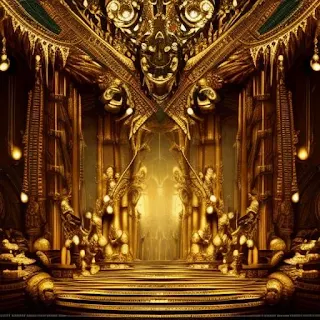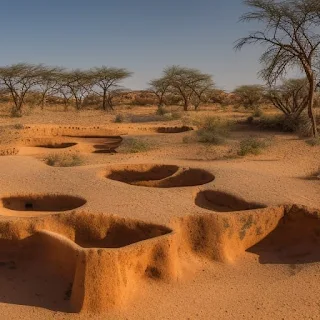A Treacherous Terrain for Treasure Hunters
Extreme weather, navigation challenges, wildlife, logistics, cryptic clues, and superstitions make the Kalahari treacherous for treasure hunters.
In the vast and unforgiving landscapes of the Kalahari Desert, a legend shrouded in mystery and fascination beckons. The Lost City of the Kalahari, a treasure hunt story passed down through the centuries, speaks of an ancient civilization hidden within its barren sand dunes. Enveloped in whispers of grandeur, untold riches, and advanced technologies, this fabled city captures the imagination of explorers and treasure hunters.
From cryptic clues to expeditions spanning centuries, the mystique surrounding the Lost City continues to captivate those who dare to uncover its secrets. The mysterious world of the Lost City of the Kalahari is where the allure of hidden treasures intertwines with the spirit of adventure and the echoes of a lost treasure of a lost civilization.
Looking for the Lost City of the Kalahari presents a treacherous terrain for treasure hunters due to the challenging nature of the Kalahari Desert itself. This vast expanse of arid land spanning Botswana, Namibia, and South Africa offers a formidable environment with its scorching temperatures, limited water sources, and vast stretches of inhospitable terrain.
It is the combination of extreme weather conditions, difficult navigation, potential wildlife encounters, logistical complexities, cryptic clues to the location, and superstitions that make the Kalahari Desert a treacherous terrain for treasure hunters seeking the elusive Lost City. Only those who possess the necessary expertise, resources, and deep respect for the environment can embark on this perilous quest with a chance of success.
The Legend of the Lost City of the Kalahari
The Lost City of the Kalahari is a legendary tale that has captivated the imagination of explorers and treasure hunters for centuries. The legend of the Lost City of the Kalahari paints a beautiful picture of an ancient city hidden deep within the vast and inhospitable Kalahari Desert. According to the tale, this city is said to have been a magnificent civilization, rich in treasures and possessing advanced technologies far beyond its time. The rumors surrounding the lost city suggest it may hold untold wealth, including gold, precious gemstones, and valuable artifacts.
The Lost City of the Kalahari Origins and Mysteries
The exact origins of the legend remain shrouded in mystery, but critical clues have been passed down through local folklore, oral traditions, and now the internet. The stories describe the lost city as a place of grandeur, with majestic buildings, intricate architecture, and advanced infrastructure. It is said to have been a thriving hub of culture, knowledge, and trade.
The location of the Lost City of the Kalahari is a subject of much speculation. Some believe it lies deep within the heart of the Kalahari Desert, hidden amidst its vast sand dunes and remote stretches. Others associate the lost city with specific landmarks, such as the Hartmann Mountains or the remote reaches of Botswana. However, these locations remain purely conjectural, as no concrete evidence of the city's existence has been found.
Cryptic Clues and Enigmatic Messages of the Location of the Lost City of the Kalahari
While the legend of the Lost City of the Kalahari remains shrouded in mystery, occasional hints and cryptic messages throughout history have fueled speculation about its location and nature. Ancient maps and manuscripts contain cryptic symbols or inscriptions that suggest the existence of a hidden city in the Kalahari Desert.
Indigenous oral traditions passed down through generations mention the existence of a lost city, often veiled in symbolism and metaphor. Unexplained artifacts unearthed in the Kalahari Desert and strange geographical anomalies reported by explorers hint at hidden structures or remnants of an ancient city. Researchers have even hypothesized that astronomical alignments or cosmic connections might hold clues to the lost city's purpose or orientation.
Expeditions and Treasure Hunters for the Lost City of the Kalahari
The legend of the Lost City of the Kalahari has attracted the attention of explorers, treasure hunters, and archaeologists who have ventured into the vast desert searching for this fabled city. Gustav Adolf von Reiswitz, Charles John Andersson, and Laurens van der Post are notable individuals who embarked on expeditions in search of the lost city. Despite their efforts, the city itself has remained undiscovered. However, exploring the Kalahari Desert has yielded important archaeological discoveries and insights into the region's ancient history, including stone tools, rock art, and remnants of early human settlements.
Andrew Collins, a British writer, and researcher, has dedicated years to studying ancient civilizations and lost cities worldwide. His extensive research has taken him to various regions, including the Kalahari Desert. Collins has examined ancient texts, conducted fieldwork, and engaged with local communities to gather insights into the legends surrounding the lost city. His findings contribute to the ongoing exploration and understanding of this enigmatic tale.
Scott Balson, an Australian author, and researcher, has devoted his time to exploring the Kalahari Desert and investigating the legend of the lost city. Balson has undertaken numerous expeditions, documenting his journeys and discoveries through photographs and written accounts. He aims to shed light on ancient civilization's hidden history and potential existence through his work.
Dr. Michael Tellinger, a South African researcher and explorer, has dedicated considerable efforts to investigating ancient civilizations in southern Africa. He has conducted extensive research in the region, including the Kalahari Desert, and believes it holds clues to the lost city's existence. Dr. Tellinger's work combines archaeological discoveries, ancient artifacts, and indigenous knowledge to piece together the puzzle of the lost civilization.
Lost City of the Kalahari Superstitions and Mystique
The Lost City of the Kalahari legend is steeped in adventure, mystery, and superstitions. According to local folklore and indigenous traditions, the Lost City of the Kalahari is believed to be protected by supernatural forces. Legends speak of ancient gods or spirits that watch over the hidden city, ensuring its secrecy and guarding its treasures from those who seek to find it.
It is believed that these guardians can unleash misfortune or even death upon those who venture into the realm of the lost city without the blessings of the desert gods. It is said that those who dare to disturb the sacred site or remove its treasures will face dire consequences.
One intriguing aspect of the lost city's mystique lies in the accounts of prophetic dreams and visions associated with its discovery. Some individuals claim to have experienced vivid dreams or visions where they receive cryptic messages or glimpses of the hidden city's location.
These dreamers believe they have been chosen by the spirits or the desert gods to uncover the secrets of the lost city. Such mystical encounters fuel the belief that the city holds a special significance beyond its material treasures. These superstitions have added to the lost city's allure and mystery, enhancing its enigmatic nature.
The Kalahari Desert is a Treacherous Terrain for Treasure Hunters
The Kalahari Desert, spanning across Botswana, Namibia, and South Africa, is a vast and unforgiving landscape that presents a formidable challenge to treasure hunters. Stretching over 900,000 square kilometers, the Kalahari is a region characterized by its arid climate, red sand dunes, and sparse vegetation. Its name, derived from the Tswana word Kgalagadi, meaning the great thirst, aptly describes the harsh conditions found within.
The desert's scorching temperatures, water scarcity, and vast expanses of inhospitable terrain make it a dangerous and challenging environment for those seeking the fabled Lost City or any hidden treasures. Navigating through the shifting sands, enduring extreme heat, and confronting the ever-present risk of dehydration and isolation, treasure hunters must contend with many natural obstacles that test their physical endurance, resourcefulness, and determination.
Moreover, the Kalahari Desert is home to various wildlife, some of which can threaten human safety. Encounters with venomous snakes, scorpions, and other treacherous creatures are a constant concern. In addition, large mammals such as lions, cheetahs, and hyenas roam the desert, adding an element of potential danger to any expedition.
The Kalahari Desert demands respect and careful preparation from those who venture into its depths, ensuring that only the most persistent and well-equipped individuals can brave its perils in pursuit of the elusive treasures that may lie hidden within.
Wouldn't the native people of the Kalahari Desert have already discovered the lost city after living there for thousands of years?
The Khoikhoi, Batswana, Nama, and San people, who have inhabited the Kalahari Desert for centuries, possess a deep cultural connection to the land and its sacred sites. They may have encountered the Lost City of the Kalahari but have chosen not to disclose its location due to their cultural beliefs and respect for these sites. For these communities, preserving their cultural heritage and the sanctity of ancestral grounds take precedence over seeking material wealth or divulging hidden treasures.
Many indigenous cultures have a profound reverence for sacred sites and a strong sense of responsibility to protect and preserve them. These sites often hold profound spiritual significance, connecting to their ancestors and the spiritual realm. The locals may view the hidden city as a sacred place deserving of respect and confidentiality. Their cultural beliefs may prioritize maintaining the integrity and sanctity of these locations rather than engaging in activities that could potentially disrupt or compromise their spiritual and cultural significance.
By choosing not to reveal the location of the Lost City, the Khoikhoi, Batswana, Nama, and San people demonstrate their commitment to preserving their cultural heritage and honoring the sacredness of their ancestral lands. Their actions reflect a deep sense of identity and a desire to protect the spiritual and cultural legacy passed down through generations. The hidden treasures of the lost city, if they exist, remain safeguarded within the realm of their cultural traditions, contributing to the enduring allure and mystique of the Lost City of the Kalahari.





